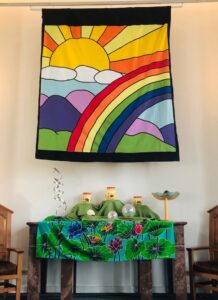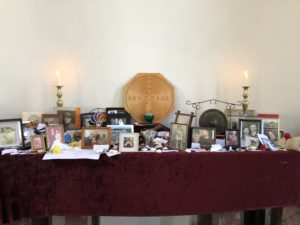Read the Order of Service
I want to tell you a story about a guy named Frankie. That’s not his real name, actually. He came from a pretty wealthy family and had one of those long, aristocratic sounding names, but all of his friends called him Frankie. And Frankie had a lot of friends. He had an outgoing personality, and an extremely charismatic spirit; he told great stories, and even better jokes; he could sing all of the popular music of his day; and, as I said, he came from a pretty wealthy family so he could throw some really awesome parties. Which he did. All the time.
On a Friday or Saturday night Frankie would get in his Bugatti Chiron and cruise around town, calling out invitations to everybody he saw. Well, almost everybody. There was a pretty large homeless population where Frankie lived, probably because of the encampment they’d made just outside of town, and Frankie just couldn’t stand the sight of them. He probably never really thought about it this way, but for him they represented the complete opposite of everything he saw himself as. He wouldn’t even, couldn’t even, look at the ones standing on the median strips asking for help as he drove by. He tried to not even think of them at all.
When the time came, Frankie volunteered to join the army and go off to fight. He expected to be as successful in this realm as he was in everything else, and had visions of honor and glory. But that’s not the way things turned out, and he came home different. He was quieter, more serious. His parties weren’t quite as much fun, and he didn’t throw them as often. He spent more time driving his Bugatti in the hills and woods that surrounded his town … thinking. He always seemed to be thinking deeply.
He’d seen such horrible things in the war, experienced such horrible things, and he was having a hard time reconciling these with the privileged life he’d been leading. He’d seen people who were so very unlike the friends he’d gathered together on Friday and Saturday nights, and he’d seen how many people had problems and challenges he could never have even imagined. And as he thought about what he’d seen he felt a growing need to do something about it, to do something about the unfairness he now saw everywhere he looked.
What he thought most about was how far to take this new sense of urgency. He made sure that he always had bottled water in his car to hand out of the window to the people on the medians. And he began to take some of the money he used to spend on parties and give it to various charities. He volunteered a bit of his time rebuilding some of the dilapidated buildings around town, even using some of his own money to pay for supplies. He started going to church … and not just on Christmas and Easter! But always the question echoing, how far to take this.
It had been a couple of months since Frankie had stopped driving his Bugatti around town and had begun walking or taking public transportation. Better for the environment, and he could give his gas money to people who needed food. He was walking down the main street in town and saw a homeless man on the median. The man was everything Frankie had despised – he was dirty, his clothes were dirty, his hair was unkempt, his teeth were bad. And yet … and yet on this day Frankie found himself looking beneath or through all of that and seeing the human being within. And that person he was now looking at was what we all are when we’re really seen – beautiful. And without even thinking about it, Frankie walked up to the man who just a few years ago he wouldn’t have even looked at, and hugged him. And at that moment he realized he that knew the answer to his question of how far to take things – he moved out of his house and moved into the encampment, and he lived there for years.
How far to take it? This feeling, this urge, to do something, to do something to address the inequities we see all around us, to make the world a better place – how far should we take it?
I know that this is a question I wrestle with a lot. Maybe some of you do, too. After I change out all of the halogen bulbs in the house for LEDs (which, I’ll confess, I haven’t quite done yet), and I make sure I diligently turn off all the power strips when I’m not using the things that are plugged into them (which I don’t), and I buy only sustainably raised foods, and wear only organic cotton clothing (washing them with non-toxic biodegradable soaps, of course), and … well … how far should I take it? How far can I take it? And, honestly, how far do I want to take it?
Do you ever wonder about things like this? Maybe you do only after a Sunday morning when you’ve felt guilted from the pulpit about all there is to do to heal this all-too broken world, or after you’ve read a book about racism like Ta-Nehesi Coates’s Between the World and Me, or listened to people talking about income inequality, or … or maybe you’ve woken up some night, in the middle of the night, and thought about the world your children, or your grandchildren, are going to inherit from us and you wonder – shouldn’t I be doing something more? Couldn’t I be doing something more? And then there’s the real question – how far am I supposed to go? How much sacrifice? How much am I supposed to give up – of my things, the way I live? How much?
After all, we’re learning – we as individuals and we as a religious movement – that it’s not enough to show up and offer our help to those people who are in need. That’s pretty easy, actually, but it really does nothing to address the underlying systems that perpetuate the problems we see around us and feel called to address. When we stay up here and reach down to help, no matter our intention we reinforce those relative positions. So we know that we can’t stay in our safe spaces and reach out our hands to give someone some assistance without having to be really touched by their problems. We know that that’s not enough. But what is enough? How far out of our comfort zones do we need to go?
As I say to my kids all the time – I have good news and I have bad news. The bad news is that that story about Frankie? It’s a true story. It’s an updated telling of the story of a young man named Giovanni di Pietro di Bernardone, who lived in the late twelfth and early thirteenth centuries in Italy, the true story of a rich kid who had it all and then gave it all away to move from the center of society to its outermost margins and throw in his lot with those who had almost nothing at all. The good news is that today we know that young man by a different name: Saint Francis of Assissi. So the bad news is that the story tells us just how far some people have been willing to go to answer that deep soul urging to make a difference; the good news is that the guy was literally a saint. Both will be important to keep in mind through the rest of the sermon.
Liberation theology, the ostensible topic for the morning, is a theological framework that appeared in modern Christianity in the Catholic Church of Latin America in 1950s, although that name wasn’t used until the Peruvian priest Gustavo Gutiérrez wrote one of the movement’s defining books, A Theology of Liberation in 1971. (It should be noted that the concept of “liberation theology,” or “a theology of liberation,” has spread far from its Latin American Catholic roots and can be seen as the foundation of Asian, Black, Womanist, and Palestinian liberation movements, to name just a few.) The simplest summation of this theology is that the God of the Gospels and the early Christian church has a “preference” for those people who are “insignificant,” “marginalized,” “unimportant,” “needy,” “despised,” and “defenseless.” Gutiérrez called this “a preferential option for the poor.”
Of course, liberation theologians would argue that this theological framework didn’t begin in Latin America in the 1950s but, rather, in Palestine in the 1st century, and that it was already really well established by Hebrew Prophets like Isaiah and Amos, Micha and Jeremiah, Ezekiel and Nehemiah. These theologies don’t say that God’s love is limited to the poor and the oppressed, just that God has a soft spot for those who have been marginalized and mistreated. “Blessed are the poor,” not because all people aren’t blessed but because the poor are so often treated as though they’re not that it bears highlighting.
St. Francis wasn’t part of the movement known as liberation theology, but he definitely saw that the place of the church was with the disenfranchised. The current Pope, not coincidentally named for the earlier saint, has said as much today. “Poverty is the flesh of the poor Jesus,” he has said, “in that child who is hungry, in the one who is sick, in those unjust social structures.” He also said, “A way has to be found to enable everyone to benefit from the fruits of the earth, and not simply to close the gap between the affluent and those who must be satisfied with the crumbs falling from the table, but above all to satisfy the demands of justice, fairness and respect for every human being.”
And good social justice minded Unitarian Universalists that we are we say, “Yes!” “Right!” “Absolutely!” Yet if you’re anything like me, while you’re affirming that ideal you’re also asking yourself, “How far do I have to take this? If I go down this road, how far will I need to go? Where will be the end of it? Will there ever be an end of it?” I ask these questions, and you may too, because I know how insatiable the needs of the world are, and I am afraid … afraid that if I set out on this path it’ll soon be one of those “slippery slopes” and I sure don’t want to end up at the bottom on … well … my bottom, all muddy and bruised and unable to get back up to where I’d been.
Remember, Giovanni di Pietro di Bernardone, and hundreds … thousands of people like him, prove that it is possible to go all the way, to so care for the poor and the oppressed as to become poor and oppressed oneself in solidarity. That is the answer he ultimately came to after wandering the hills of Assissi wondering how far to go. All the way; no holding back. And if his, and their, testimony is to be believed, rather than some kind of regrettable burden this going all the way opened the way for a joy that had been previously unimaginable to him. Giving up his wealth, he asserted, brought him to a richness incomparable.
Remember too, though, that young Francesco was a saint and that we – again, if you are anything like me – are not. So how far should we go? How far can we go? And, let’s be honest, how far do we want to and are we willing to go? I don’t know. I don’t know the right answer to that for you; I can’t say that I’ve yet figured out the answer for myself. I can say, though, that I don’t believe the answer is, for me or for most of you either, as far as St. Francis went, but I do believe it’s farther than I have gone so far. I do believe, I know as a certainty, that I need to go farther than I have so far, and I know that it’s not going to be easy. I know that I’ll take most of the steps kicking and screaming. But maybe, just maybe, if we help one another, it’ll be easier. And maybe that’s part of what it means that we Unitarian Universalists are a people of liberation. It means that none of us have to be about this work on our own. We can walk this path together. In fact, it’s really the only way we can.












